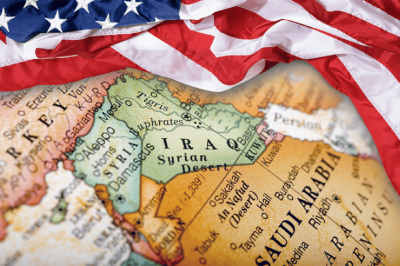Since the early 20th century, the U.S. has been involved in the Middle East for its oil resources and to counter Soviet influence. The U.S. had alliances with some key players like Saudi Arabia and Israel. After the U.S. abandoned the Bretton Wood system, it went into a deal with Saudi Arabia, which we know as the Petrodollar deal. The deal was to maintain the stability of the dollar.
The U.S. gained economic stability and further influence within the region, while Saudi Arabia received military protection and access to international markets. The deal was a turning point in the region’s politics as the U.S. gained influence in economic and political decisions.
Furthermore, the Camp David Accords, aimed at a broader Arab-Israeli peace, were carried out under the umbrella of the U.S. Although they failed incredibly, the first peace treaty between Egypt and Israel was signed in 1979, where President Jimmy Carter personally mediated the negotiations.
The strategic goals behind this were to isolate and weaken the Soviet Union’s influence in the Arab World and reduce regional tensions. The treaty was a turning point for Egypt-Israeli relations. However, it ignored an important factor, which was the Palestinian issue, as they were left excluded, and the limited autonomy was inadequate. This led to a prolonged asymmetrical Israel-Palestine conflict.
After the Cold War era, Al Qaeda took action against the U.S. military installations in the Middle East. The 9/11 attacks further ignited the situation, and the global war on terror started. The U.S. increased its military presence in the region to deal with ISIS and combat Al Qaeda Affiliates in the Middle East. The rise of ISIS in the region was also the result of U.S. military operations and the invasion of Iraq.
The Bush administration justified its invasion of Iraq as they believed that they possessed weapons of mass destruction (WMDs) and were directly involved in the September 11 attacks.
Also Read: Tragic helicopter crash claims lives of Iranian President Ebrahim Raisi and Top Officials
However, later, it was found that there were no weapons of mass destruction and no connection with the 9/11 attacks. This action of the U.S. destabilized the region, and the period of violence started, which continues to this day. It was taken for the U.S. to be interested in the resources they have utilized for many years.
The U.S. has continued to engage with OPEC and the individual states. The rise of U.S. shale oil production and the shift to renewable energy has reduced regional involvement. Favoring diplomacy and financial support over military intervention. This has impacted the Middle East’s political landscape and raised concerns among Arab states about U.S. actions.
The U.S. absence has created a security vacuum, allowing Iran in Syria, Iraq, and Lebanon to expand their influence. The tides are shifting against Washington’s foreign policy. Arab states’ responses vary. Some express relief, while others worry about their security. On the one hand, the U.S. has withdrawn from the region for now.
However, on the other side, it is supporting its regional ally Israel on international platforms and within regional activities. Joe Biden’s recent statements have been criticized for showing a biased, anti-Palestinian stance rather than promoting ceasefire and peace. Some see U.S. policies in the region as fostering development, while others view them as undermining peace. U.S. actions are a significant factor in the current situation in the Middle East.
China’s involvement and recent Iran-Saudi Arabia negotiations are positive factors in the Middle East’s unstable political environment. However, the United States needs to maintain a constructive approach to the development and peace of the region.
** The opinions expressed in this article are solely those of the author and do not reflect the views or position of World Affairs Insider. The organization neither endorses nor takes responsibility for the content of this article and its accuracy.

International Relations student with solid academic basis in Diplomatic Relations, International Law and Intercultural Communication. Her writings focus on international relations, feminism and current trends.







